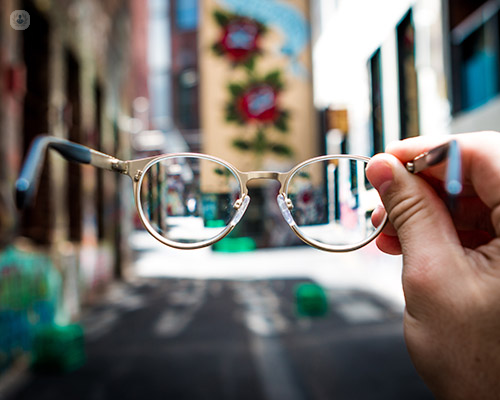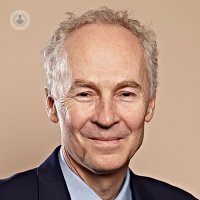What you want to know about laser eye surgery - part 1
Written by:Laser eye surgery is a range of techniques that corrects sight problems, including short-sightedness, long-sightedness and astigmatism. Get more information on laser eye surgery from expert ophthalmologist, Mr Bruce Allan in this two part series. This first part distinguishes the different types of laser eye surgery, the benefits, suitability and choosing the best treatment for yourself.

What is laser vision correction?
Laser vision correction (LVC), also commonly referred to as laser eye surgery, is a collection of techniques in which myopia (short-sightedness), hyperopia (long-sightedness), and astigmatism (irregular defocus) are corrected by altering the front surface shape of the cornea – the clear window at the front of the eye wall.
The main types of LVC are:
- LASIK (laser in situ keratomileusis)
- PRK (photorefractive keratectomy)
- SMILE (small incision lenticule extraction)
These are all 15-minute treatments performed with drop anaesthetic. Both eyes are normally treated on the same day.
Modern techniques are safe, effective, and transformative for patients whose lives are restricted by reliance on contact lenses or spectacles.
What are the benefits?
Most patients are able to see at a normal level after a single treatment, and the effects are lasting. With modern techniques, you should expect to see what you are able to see in soft contact lenses, but without the discomfort and the hassle.
More than 98% of patients undergoing LASIK for myopia and astigmatism, the commonest LVC treatment, are happy with the results and many describe it as life changing.
Although LVC is not currently available as an NHS treatment, and is therefore often bracketed with cosmetic surgical procedures, the benefits are functional. By freeing you from glasses and contact lenses, LVC helps you to engage in a healthy, active lifestyle more easily.
Who is suitable?
You need to have a stable spectacle prescription for 2 years, and very few clinics treat patients under18 years of age. Changes in reading glasses strength with age are normal from the mid-40s on and do not affect eligibility for surgery.
You need a normal eye surface, a healthy cornea, and a clear natural lens. Your surgeon will have access to a bank of pre-treatment tests to help determine your suitability, and will be able to give you pre-treatment advice on optimising your eye surface health.
Many patients are told incorrectly that discomfort in contact lenses means they have dry eyes, and that this means they are unsuitable for LVC. Contact lens related discomfort actually has a range of causes, and most dry eye problems in younger patients can be treated effectively. So LVC is often a good way out of contact lens related discomfort.
What is the best treatment for me?
The main techniques all work well and produce similar end results in the right patients. The difference largely boils down to speed of recovery. It is possible to go back to work the day after LASIK, whereas surface treatments such as PRK require a week off work. SMILE is somewhere between.
It is essential that you meet your surgeon to discuss procedure choice once all your tests have been done. Different patients suit different LVC techniques, and implant based procedures may often be a better option. These include ICL (implantable contact lens) implantation for younger patients with a high spectacle prescription, and refractive lens exchange (RLE) for older patients.
What if I am already in the reading glasses age group?
Surgeons commonly offset the focus in one eye to help extend the range of activities you can do without glasses later in life. Although the idea of having one eye with a better distance focus and the other with a better focus at arm’s length may seem strange, the input from both eyes combines in your one view of the world to provide much greater freedom from reading glasses. After a few weeks of adaptation this feels perfectly natural.
Variations on this approach are called micromonovision, blended vision and presbyLASIK. They work particularly well for patients with hyperopia (long sight), which commonly starts to affect people in the reading glasses age group. Hyperopic patients first need reading glasses, then distance glasses or varifocals too.
Hyperopia is a common problem in mid-life, and LVC using modern laser systems is a highly effective solution.
If you are interested in laser eye surgery, make an appointment with a specialist.



